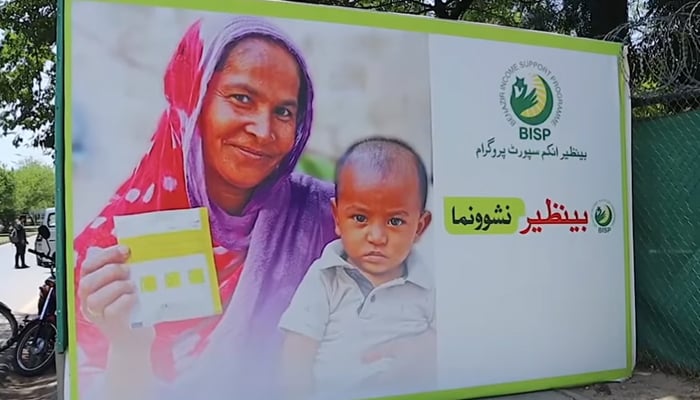BISP to expand scope of country’s largest nutrition programme
Islamabad:In order to combat malnutrition, Benazir Income Support Programme (BISP) has planned to expand the scope of Benazir Nashonuma initiative which is the country’s largest nutrition programme.
In this regard, BISP has signed a two-year agreement with the World Food Programme (WFP) in a ceremony held at Rome to extend the Benazir Nashonuma Programme which is also one of the major government-funded initiative in WFP’s history.
According to an official source, this partnership strengthens BISP’s commitment to combat malnutrition in Pakistan, providing essential support to over four million pregnant women, breastfeeding mothers, and children less than two years of age.
The initiative will help build a healthier future for Pakistan’s children through collaborative efforts. World Food Programme (WFP) has been the lead implementing partner for Benazir Nashonuma initiative since its inception.
Benazir Nashonuma initiative aims at addressing stunting among pregnant and lactating women (PLW) and their children less than two years of age through the provision of additional cash of Rs2,500 per quarter per PLW and boy child each and Rs3,000 per quarter per girl child of BISP beneficiary families. While Rs1,500 are given to the girls aged between 15-19 years.
For the flood affected areas, Rs3,500 are given to per PLW and boy child each and Rs4,000 for girl child. In return, mothers are required to attend regular antenatal health checks and awareness sessions during pregnancy, consume specialised nutritious food (SNF), and take their children for immunization and regular health checks.
According to the statistics, Pakistan’s high rates of malnutrition (40.2 per cent stunting, 28.9 per cent underweight, and 17.7 per cent wasting) are indicative of an ongoing child nutrition crisis. The first 1,000 days of a child’s life are a window of opportunity to lay a strong foundation for later achievements.
-
 Marc Anthony On Why Bad Bunny’s Super Bowl Show Mattered
Marc Anthony On Why Bad Bunny’s Super Bowl Show Mattered -
 Kid Rock Gets Honest About Bad Bunny’s Performance At Super Bowl
Kid Rock Gets Honest About Bad Bunny’s Performance At Super Bowl -
 Kylie Jenner Reveals Real Story Behind Her 'The Moment' Casting
Kylie Jenner Reveals Real Story Behind Her 'The Moment' Casting -
 Halsey Marks Fiancé Avan Jogia's Birthday With Emotional Note
Halsey Marks Fiancé Avan Jogia's Birthday With Emotional Note -
 China: Stunning Drone Show Lights Up Night Sky Ahead Of Spring Festival 2026
China: Stunning Drone Show Lights Up Night Sky Ahead Of Spring Festival 2026 -
 Andrew's Epstein Scandal: Will King Charles Abdicate Following King Edward's Footsteps?
Andrew's Epstein Scandal: Will King Charles Abdicate Following King Edward's Footsteps? -
 Billy Joel Leaves Loved Ones Worried With His 'dangerous' Comeback
Billy Joel Leaves Loved Ones Worried With His 'dangerous' Comeback -
 Prince William Dodges Humiliating Question In Saudi Arabia
Prince William Dodges Humiliating Question In Saudi Arabia -
 Dax Shepard Describes 'peaceful' Feeling During Near-fatal Crash
Dax Shepard Describes 'peaceful' Feeling During Near-fatal Crash -
 Steve Martin Says THIS Film Has His Most Funny Scene
Steve Martin Says THIS Film Has His Most Funny Scene -
 Kensington Palace Shares Update As Prince William Continues Saudi Arabia Visit
Kensington Palace Shares Update As Prince William Continues Saudi Arabia Visit -
 Fugitive Crypto Scammer Jailed For 20 Years In $73m Global Fraud
Fugitive Crypto Scammer Jailed For 20 Years In $73m Global Fraud -
 Will Andrew Mountbatten-Windsor Finally Go To Jail Now That King Charles Has Spoken Out? Expert Answers
Will Andrew Mountbatten-Windsor Finally Go To Jail Now That King Charles Has Spoken Out? Expert Answers -
 Melissa McCarthy Reveals Her Tried And Tested ‘corpse’ Night Time Routine That’s Lost Her 95lbs
Melissa McCarthy Reveals Her Tried And Tested ‘corpse’ Night Time Routine That’s Lost Her 95lbs -
 Horrifying Pictures Of The Kidnapper Of Savannah Guthrie's Mother Released
Horrifying Pictures Of The Kidnapper Of Savannah Guthrie's Mother Released -
 Andrew's Ex-girlfriend Launches Brazen Attack On Epstein Victims On Piers Morgan Show
Andrew's Ex-girlfriend Launches Brazen Attack On Epstein Victims On Piers Morgan Show




